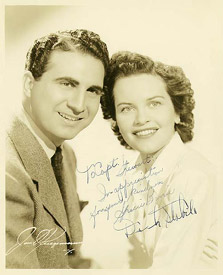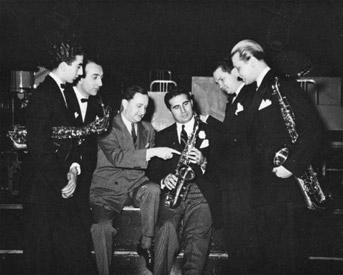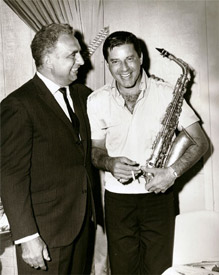Dick Stabile by Joe E. Stabile
Dick’s father was a known musician, a violinist with the Vincent Lopez Orchestra at a major New York hotel. He came from a musical family. Vincent Lopez asked Dick’s father to get a saxophone as a double because it was gaining in popularity. His father bought an alto saxophone, a “Selmer”, and brought it home to practice. Dick was about thirteen years old and the saxophone got his interest. He tried to play it and he wouldn’t give up. He took some lessons and it was obvious that the saxophone was for him. Music was in his heart... he was born with it. His family had music going day and night at home -- radio, and an electric piano that played rolls of classical music. Dick would sit at the piano and teach himself all the chords on the piano. That and the sax was all he wanted.
Dick was fifteen years old when he got a job playing saxophone in the pit band for a Broadway show. At about that time (early 1930’s) he joined the Ben Bernie Band as lead alto and soloist. Ben Bernie had a weekly radio show, and the “Old Maestro”, as he was known, featured Dick as a soloist. At that time it was a large step forward musically. Dick would sit at the piano and make arrangements for the band, and in 1936 he started his own band with his wife, Gracie Barie, as the singer. They toured the country and the band was very well-received. Dick was a great innovator and was the first to have more than three saxophones in the band. He used a total of five, including himself, which created a great sound. Sometimes Dick played a C-melody sax for solos, which was very rare at that time.
Dick Stabile had a long run at the Lincoln Hotel in New York City, with great arrangements and a swinging band during the same period when the Astor and other big hotels had society bands. I believe Benny Goodman and Glen Miller came later. I joined the band for the duration, playing tenor sax. It wasn’t easy being Dick Stabile’s brother. I had none of the natural talent that he had, and worked my tail off to keep up with the rest of the saxophone section.
After the long stint at the Lincoln Hotel we hit the road again and were rehearsing for a concert in Columbus, Ohio, when the news came over the radio that the “Japanese Bomb Pearl Harbor.” Soon after, Dick broke up the band and enlisted in the Navy as the leader of the orchestra. I enlisted in the Air Force at Bolling Field in Washington, DC The Air Force didn’t have a band and needed several musicians. Three other men from Dick’s band were the and it seemed like home.
After the war Dick moved to Los Angeles, and got the band together at a night club on Wilshire Blvd. called “Slapsie Maxie’s”, and the rest is history. Dean Martin and Jerry Lewis hit pay dirt in New York at the Copa Cabana. You couldn’t get at table -- people screamed! Their next engagement was at Slapsie Maxie’s. Dick was made to order for them... they used him as a prop-- Dick and the band would laugh so much we never knew what they were going to do next... it was bedlam!
All of the film crowd were there nightly, and Hal Wallis, a top producer, signed them to a movie contract. They made several pictures for Paramount, and Dick was always the band leader. Dick was with them the whole ten years that they were together. He went to New Orleans, and had his band at the Roosevelt for several years. It was there that he had a stroke. He returned to work at the Roosevelt after recuperating, and finally dies of a heart attack.
Dick and Jerry were very close and Jerry was always there for him. When Dick had his stroke his left side was paralyzed and he could no longer play the saxophone. He didn’t want to do therapy, so Jerry Lewis and I went to New Orleans. Jerry read him the riot act for not doing his therapy, and told him that if he did it he would be able to play the sax again and that he would let him play a solo spot on the telethon that coming September. Dick was a “ham” and worked real hard to get both hands working. He did the telethon and played “The Man I Love,” ending on a high note that only he could do at the time -- a full octave above the top range of a saxophone. Dick Stabile was rare... he had his own unique fingering and a sound that was his alone!


